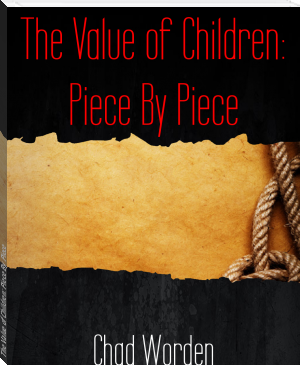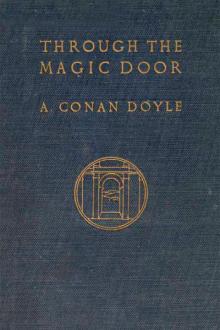The Value of Children: Piece By Piece - Chad Worden (top fiction books of all time txt) 📗

- Author: Chad Worden
Book online «The Value of Children: Piece By Piece - Chad Worden (top fiction books of all time txt) 📗». Author Chad Worden
The Value of Children: Piece By Piece
By Chad Alexander Worden
4/6/2001 4:55 p.m.
In Bernard R. Berelson's, The Value of Children: A Taxonomical Essay, the author asks, "Why do people want children?" He poses the idea of the value children, quoting others as they tried to explain their evaluations of children and childbearing. Berelson extends his own opinion in a logical manner, seemingly trying to convey the negative, neutral, and positive aspects of children and child care while expressing his own thoughts on the matter. However, in today's society, we usually taking more a illogical view of existence in general.
Berelson starts his essay by simply stating, "Why do people want children?" He continues through the next few paragraphs analyzing this question itself and the basis of our civilization as a whole. A quick lesson in history and a few rhetorical questions later, leads us into the biological, cultural, political, economic, familial, and personal reasons for having children. He references to a "rich man, poor man" scenario several times to describe wealth, in the sense of family, being a direct correlation to one's status in life. Berelson describes the poor man as being three to four times wealthier than the rich man in children, while the rich man dwarfs the poor man in material possessions by at least forty times in income.
In my reading, I counted at least three direct quotes in the essay. One from Eckhard H. Hess Ethology and Developmental Psychology, which was published in Paul H. Musser's edition of Carmichael's Manual of Child Psychology. Another quotation from Burton Benedict's Population Regulation in Primitive Societies, published in Anthony Ellison's Population Control. Perhaps the most notable quotes are always from poets, as in the reading when Berelson quotes Shakespeare's Sonnets, III. Each of the quotations seems to have a tying theme of an almost immortal atmosphere. Children as an extension of us into the future seems to be prevalent, along with the idea of a working class of children.
In reading this piece, I began to notice Berelson trying to maintain a detached tone, but not wholly succeeding. As he went on, it seemed that more and more of his opinion and love of children slipped through his fingers onto the page. His continual reference to the "rich man, poor man" suggested that he had strong feelings on this subject that needed to be explained or clarified in a future article. He did bring up both sides of the issue as often as possible, but he would tend to lean towards what one could obviously tell was his "side of the fence".
It is unfortunate that in today's American society that we so thoroughly contradict ourselves. While holding on to the moral ideal of the family unit, we allow such as NAMBLA (North American Man Boy Love Association) to openly express such perverse and illegal activities. The moral value of life in America is high, but it is often treated as Berelson so accurately puts, "another consumer durable".
ImprintPublication Date: 04-09-2016
All Rights Reserved





Comments (0)